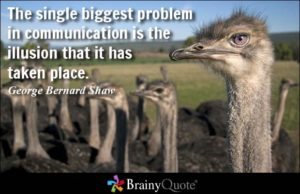 This is the third post in a series focusing on the interpersonal skill of communications
This is the third post in a series focusing on the interpersonal skill of communications
In the initial post I discussed how communication is the exchange of information between two or more people. Last week’s post focused on the importance of questions, not only to solicit the specific information you seek, but the way in which well-crafted questions can create the space for an engaging conversation. This week I explore the power of communication: how communication can influence, persuade, or make an impact; how self-confidence, credibility, and effectiveness are associated with powerful communication.
Here are some ways for you to enhance the power of your verbal communications:
- Stick to the point. Powerful communication is not about saying as many things as you can in a given period of time. Rather, it is about sticking to that which is relevant to the discussion, and getting your message across in the shortest — but most impactful — way possible. Get rid of fillers like “uhm…”, “you know”, or “actually” in your delivery, and avoid off-topic statements. Just provide the bare bones — the ideas your audience would be most interested in knowing, or the ones that best promote your intentions.
- Don’t be too casual. Phrasing that is appropriate for a conversation with friends is not necessarily appropriate for business-related discussions. The use of slang, street talk, and poor grammar can detract from your credibility, especially if you’re mingling with potential clients, employers, and business partners. Events that require you to make the best possible impression may require the use of industry-specific vocabulary and a formal tone — so adjust accordingly.
- Emphasize key ideas. Stress the highlights of your communication. For example, people who are delivering a sales pitch should emphasize the main features of their product or service. Those who are presenting their opinion on an issue should explain the crux of their arguments, and build from there. Even if you’re merely expressing interest or congratulations, make sure your partner in communication will remember what you’ve said.. Emphasis in verbal communication comes in many forms, including repetition of key points, giving specific examples, accenting particular adjectives or nouns, or even directly saying that “this is really a point I want to emphasize.”

- Tailor-fit your communication to your audience. A powerful communication is one that connects with one’s audience. In this case, minding the readiness, attention, age, and educational level of your audience is very important, so that you neither overwhelm nor underwhelm them. Social skills are primarily about flexibility; the better you can adjust to changes in your audience profile, the more successful you’ll be.
- Connect. Power in communication is sometimes determined by the quality of your rapport with others. You may need to “warm up” your audience, make them comfortable, and show them that you sincerely want to talk with them. The more others see you as “one of them”, the more receptive they will be to anything you say.
Words are powerful tools of communication. Indeed, word choice can easily influence the thoughts, attitudes, and behavior of the people listening to us. Similarly, proper attention to the language of others can give us insight to what they are really saying, helping us to respond appropriately and effectively.
Using non-verbal communication can also be a significant in connecting with others. More about that in next week’s post.
_________________________________________________________________________________________________________________________________
John Whitehead, coaches individuals and organizations in becoming more effective by helping them improve their interpersonal communications, emotional intelligence and resiliency.
*******Are you wondering if having a Leadership/Personal Development Coach is right for you? Contact John for a complimentary, exploratory coaching session at john@johnkwhitehead.ca********
If you would like to get notifications for when I post, please go to my blog site and register. I promise I will not spam or use your email address for anything else. You can visit and register for my blog at https://johnkwhitehead.ca/blog-2/
